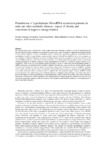Perturbation of hypothalamic MicroRNA expression patterns in male rats after metabolic distress: impact of obesity and conditions of negative energy balance

Use este enlace para citar
http://hdl.handle.net/2183/16294Coleccións
- GI-FENM - Artigos [109]
Metadatos
Mostrar o rexistro completo do ítemTítulo
Perturbation of hypothalamic MicroRNA expression patterns in male rats after metabolic distress: impact of obesity and conditions of negative energy balanceAutor(es)
Data
2014-02-11Cita bibliográfica
Sangiao-Alvarellos S, Pena-Bello L, Manfredi-Lozano M, Tena-Sempere M, Cordido F. Perturbation of hypothalamic MicroRNA expression patterns in male rats after metabolic distress: impact of obesity and conditions of negative energy balance. Endocrinol. 155(5):1838-1850
Resumo
[Abstract] The hypothalamus plays a crucial role in body weight homeostasis through an intricate network of neuronal circuits that are under the precise regulation of peripheral hormones and central transmitters. Although deregulated function of such circuits might be a major contributing factor in obesity, the molecular mechanisms responsible for the hypothalamic control of energy balance remain partially unknown. MicroRNAs (miRNAs) have been recognized as key regulators of different biological processes, including insulin sensitivity and glucose metabolism. However, the roles of miRNA pathways in the control of metabolism have been mostly addressed in peripheral tissues, whereas the potential deregulation of miRNA expression in the hypothalamus in conditions of metabolic distress remains as yet unexplored. In this work, we used high-throughput screening to define to what extent the hypothalamic profiles of miRNA expression are perturbed in two extreme conditions of nutritional stress in male rats, namely chronic caloric restriction and high-fat diet–induced obesity. Our analyses allowed the identification of sets of miRNAs, including let-7a, mir-9*, mir-30e, mir-132, mir-145, mir-200a, and mir-218, whose expression patterns in the hypothalamus were jointly altered by caloric restriction and/or a high-fat diet. The predicted targets of these miRNAs include several elements of key inflammatory and metabolic pathways, including insulin and leptin. Our study is the first to disclose the impact of nutritional challenges on the hypothalamic miRNA expression profiles. These data will help to characterize the molecular miRNA signature of the hypothalamus in extreme metabolic conditions and pave the way for targeted mechanistic analyses of the involvement of deregulated central miRNAs pathways in the pathogenesis of obesity and related disorders.





